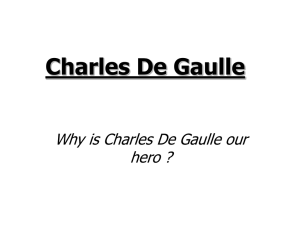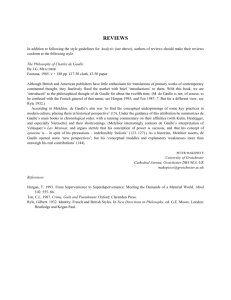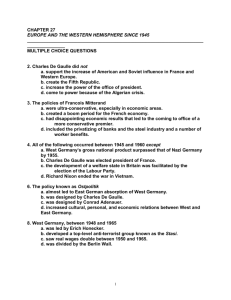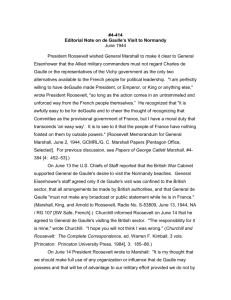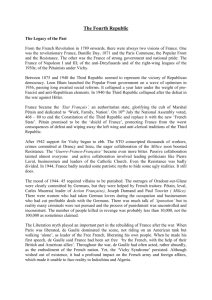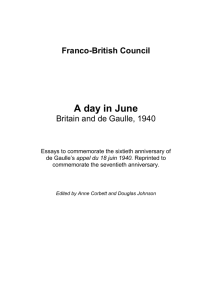france and franco-indian relations since 1958
advertisement
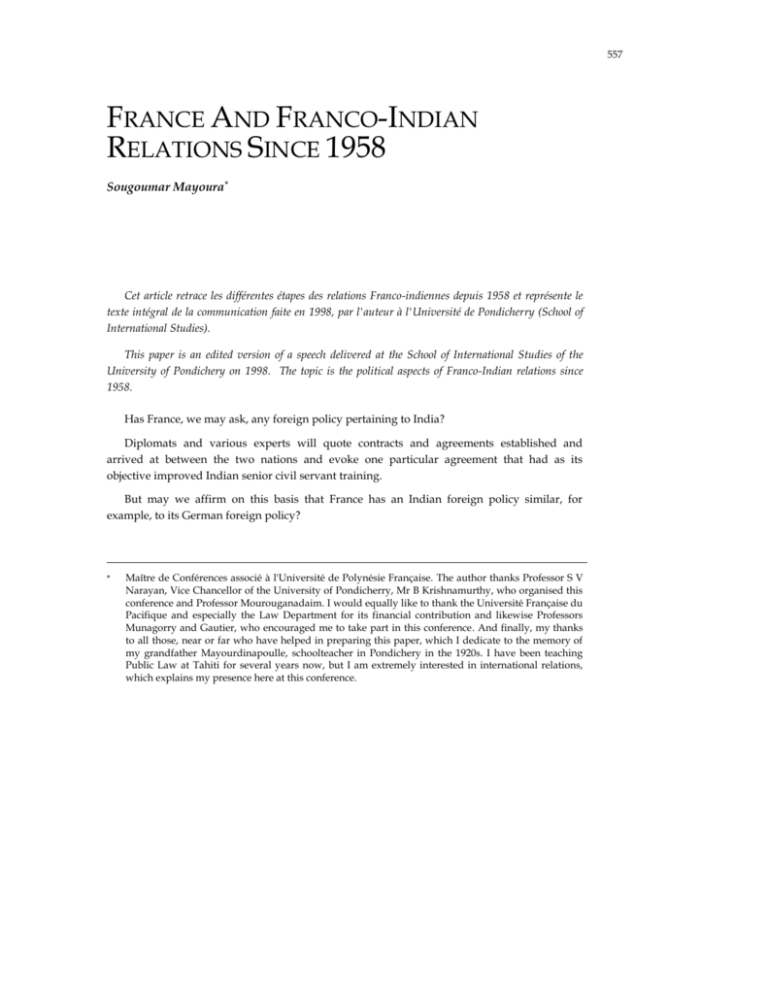
557 FRANCE AND FRANCO-INDIAN RELATIONS SINCE 1958 Sougoumar Mayoura* Cet article retrace les différentes étapes des relations Franco-indiennes depuis 1958 et représente le texte intégral de la communication faite en 1998, par l'auteur à l'Université de Pondicherry (School of International Studies). This paper is an edited version of a speech delivered at the School of International Studies of the University of Pondichery on 1998. The topic is the political aspects of Franco-Indian relations since 1958. Has France, we may ask, any foreign policy pertaining to India? Diplomats and various experts will quote contracts and agreements established and arrived at between the two nations and evoke one particular agreement that had as its objective improved Indian senior civil servant training. But may we affirm on this basis that France has an Indian foreign policy similar, for example, to its German foreign policy? * Maître de Conférences associé à l'Université de Polynésie Française. The author thanks Professor S V Narayan, Vice Chancellor of the University of Pondicherry, Mr B Krishnamurthy, who organised this conference and Professor Mourouganadaim. I would equally like to thank the Université Française du Pacifique and especially the Law Department for its financial contribution and likewise Professors Munagorry and Gautier, who encouraged me to take part in this conference. And finally, my thanks to all those, near or far who have helped in preparing this paper, which I dedicate to the memory of my grandfather Mayourdinapoulle, schoolteacher in Pondichery in the 1920s. I have been teaching Public Law at Tahiti for several years now, but I am extremely interested in international relations, which explains my presence here at this conference. 558 (2000) 6 RJP I will reply in the negative to this question and may not be effectively contradicted as French President Chirac himself asserted in a speech in Mumbay in January 1998: "We must admit that France and India have not been the partners they should have been". Why? Because, despite favourable circumstances, France is still in search of a definitive foreign policy in relation to India. I FAVOURABLE CIRCUMSTANCES I would like to underline the existence of four factors favourable to the establishment of a broad French foreign policy, as regards India. These factors are: a favourable historical and cultural background, a continuity of French foreign policy, a commitment on the part of both nations to similar ideals and legal principles, and similar orientations in foreign policy. A Favourable Historical And Cultural Background I will not go over the reasons for the French presence in India from the 17th century onwards. The 1763 Paris Treaty reduced the number of French establishments to five. Leaving colonial history aside, there was in addition, on the part of France, a form of cultural attraction to India. France has inherited a great tradition of research in India. From very early on, thanks to intellectuals such as Anquetil-Duperon, Burnouff, Renan and Taine, Indian culture and philosophy came to the fore. Today Renou Filliozat and Biardeau continue in the same vein. This tradition of research was not accessible simply to the highly specialised chosen few: institutions rapidly saw the light of day and the Oriental Languages School was established in 1795; the first chair in Sanskrit was accredited in 1812 at the College de France. The relations between the two countries were established by the French East India Company in 1664. The company set up trading posts at Pondicherry, Chandernagor, Mahé, Karikal and Yanaon. The French government wanted to develop trade links with India, but through trade, the French people was attracted by Indian exoticism. Mutual discovery and knowledge flowed on both sides as French citizens throughout India worked in various fields for Indian independent states, in Mysore, Gwalior. After the FRANCE AND FRANCO-INDIAN RELATIONS SINCE 1958 Napoleonic Wars, many French soldiers became military or political counsellors of Indian states. In 1954,the five main French settlements returned to India. But, these sites have found a place in the textbooks of French school children. Forty-five years later traces of the historical heritage remain visible and the specificity of Pondicherry is quite evident. Today, Pondicherry is a Union Territory. The trading posts, with the exception of Chandernagore, were not incorporated into the states, in which they were landlocked. The status of Union Territory confers on Pondicherry considerable fiscal and economic advantages. This must be fortunate for its inhabitants, for India, and for France. Following the terms of the treaty of transfer, Pondicherry has an important French community (near 9000 citizens registered with the French Consulate1). The French citizens in Pondicherry are the descendants of the Indians who opted for French nationality in 1954. The number has been going down steadily, for two reasons: first, the military personnel returning to India after 15 or 20 years of military service is decreasing, second all the young people in the age group 18-20 with or without their "baccalauréat" leave for higher studies in France or for trying their luck. Today, apart, from the French Lycée with some 1500 students (from nursery to high school) which disseminates French culture and language, Pondicherry, has the advantage of institutions of international repute: the French Institute, the French School of the Far East, which constitutes an important vector of the knowledge of India in France. B Continuity Of French Foreign Policy Maurice Couve de Murville, Prime Minister, and Foreign Affairs Minister from 1958 to 1968 in the de Gaulle government, wrote in 1971 a now-forgotten book entitled Une Politique Etrangère:1958-1969. He affirms "Policy in whatever domain is based on particular conditions. Where foreign policy is concerned three essential requirements must be filled: Will, Liberty and Continuity.2 In the period under discussion, from 1958 to the present day, there has been a certain continuity in foreign policy orientation. This is clearly visible from 1958 to 1969 as General de Gaulle, and Couve de Murville were the only two actors in this area. 1 French International News Document,n°5,1998. 2 "The Bulletin", January 1997, edited by the French Embassy in New-Delhi. 559 560 (2000) 6 RJP Later, the Foreign Affairs ministerial post went from person to person, but stability was maintained at the presidential level by the Giscard d'Estaing, Mitterrand and Chirac government mandates. This applies equally well to the Indian political front as the Foreign Affairs portfolio was often under the Prime Minister's jurisdiction. C Commitment On The Part Of Both Nations To Similar Ideals And Legal Principles Jules Michelet in his Bible de l'Humanité declared:3 From India shone a flood of light, the river of reason, an law. You are the ancient civilisation.Your race is 89.... Nehru in Discovery of India writes:4 .....In regard to individual and political rights and civil liberties we were influenced by the ideas of the French and American revolutions.... And the "Long live the Nation" cry dear to the 1789 revolutionaries, does not greatly differ from that of "Vande Madaram" characterising the Indian separatist movement.Both terms include a marked reference to "mother earth" or the country of birth. The French Republic motto "Liberty, Equality, Fraternity", which appears in article 2 of the October 1958 Constitution, was not overlooked in the 1949 Indian Constitution,notably in the preamble. Similarly, the preamble of the 1946 French Constitution, an integral element of the Constitution as a whole, speaks of civil and economics liberties, as does the Indian Constitution in articles 39,41,42,47,and 48 where rules allowing the edification of a just and balanced society are determined. Let us mention in passing that the preamble of the October 1946 Constitution enunciated principles that where echoed in the 1958 Constitution preamble and which acquired constitutional value only in 1971,whereas the Indian Constitution established constitutional rules in the economic and civil liberties domain as early as 1947. 3 Maurice Couve de Murville, Une politique étrangère 1958-1969 (Paris, Plon, 1971). 4 Jules Michelet, Bible de l'Humanité (Paris, Chamerot,1864). FRANCE AND FRANCO-INDIAN RELATIONS SINCE 1958 Concerning foreign policy, the 1946 Constitution preamble points to a "French Republic, true to its tradition, conforming to international public law dictates....". The Indian Constitution in article 51 makes clear India's intention to respect international law and treaties. D Like Orientations In Foreign Policy It would be slightly exaggerating to suggest that Indian and French foreign policies are identical, but it is nevertheless worth noting that certain aspects of both are similar, in some respects. First, both nations are receptive to the idea of "glory or grandeur". General de Gaulle, in Mémoires de guerre writes:5 France is herself only when she is leading the...way amidst others, being as they are, must aim high and remain firmly standing if she is to avoid danger, France cannot be France without grandeur... Jawaharlal Nehru for his part in The Discovery of India particularly in chapter 3 entitled "The Quest" looks at India's past glory.6 Moreover, his well-known "Trust with Destiny" speech, delivered at the Assembly on 14 August 1947, highlights the nature of his quest for India's past glory and grandeur to come: 7 At the dawn of history, India undertook her eternal quest, and immemorial century witnessed her struggle, her glorious victories as well as her defeats. In success or in failure she has never lost sight of this quest or the ideals that make for her strength. Today, the time of setbacks is at an end and India is being reborn. Today's success is but a step, an opportunity, in the direction of victory and the greater fulfilment awaiting us. Both nations focus on the concepts of status and position on the international scene. General de Gaulle was heavily preoccupied with conserving French standing in the years following the June 1940 defeat, but also after 1958. 5 Jawarhalal Nehru The Discovery of India (London, Meridian Books Limited, 1956). 6 Charles de Gaulle Mémoires de Guerre (Paris, Plon, 1954). 7 Nehru The Discovery of India above n 5. 561 562 (2000) 6 RJP Only after a tenacious struggle with the English, the American and the Russians did General de Gaulle manage, after June 1940, to secure French participation in the settling of post-World War II issues and France's seat on the Security Council. Following this, conserving the French position become an element of foreign policy that was reflected in the construction of Europe, in the tumultuous relationship with the United States as well as in the Pnom-Penh speech. De Gaulle's successors pursue this same policy but with perhaps a little less verve as seen at Mitterrand's Cancun conference. Where India is concerned, this search for position or station, has another basis. Firstly, in the 1950s, India attempted to promote a certain moral approach to international relations. Later, with development in space, in computer and nuclear technology, India is endeavouring to make its presence felt on the international scene. Concretely speaking, securing a seat on the United Nations Security Council as a permanent member, encapsulates the leaders' conception of the pursuit of standing. Both nations hold common views on national independence or national sovereignty. France's search for national independence has two tangents: 1 First, the desire to move away from the Atlantic framework: by favouring dialogue with Moscow, by legitimising Peking, by rejecting the proposal for the creation of an integrated nuclear force under American command within NATO. Second, by the consolidation of nuclear capacity. Thus, General de Gaulle declared on 3 November 1959: 8 The idea of a war or even that of a battle, that France would be unable to solely engage in and in whichever manner she chose....is unacceptable. 8 Nehru La promesse tenue (Paris, L'Harmattan, 1986). FRANCE AND FRANCO-INDIAN RELATIONS SINCE 1958 The "integration" system is no longer tenable. The consequence is of course the necessity for our nation to be able to attend to its own needs translated by the possession of force that we may independently, deploy a "strike capacity" available at any time or place. It goes without saying that the basis of this capacity will be atomic weaponry, French or purchased elsewhere, but which must belong to us. In India's case, the independence theme is not as clear, non-alignment is the term used. This expression evokes a form of reserve or passivity that does not have the same impact as the term independence, translating determination and voluntarism on the international scene. On the other hand, by the recent nuclear tests, India conforms exactly to the de Gaulle's remarks in November 1959:9 If France were asked to agree to nuclear disarmament while others were in possession of and developing such arms in great quantities, there would be no hope of her accepting such an invitation. The Indian Prime Minister's remarks at Pokhran on 20 May run somewhat parallel to de Gaulle's position. The Prime Minister said: "We will pay any price for the country's security".10 To conclude, national independence in the French version and the Indian version of nonalignment do resemble each other to some extent. Thus de Gaulle and post-de Gaulle France has remained a Western ally. Moreover, independence does not exclude alliances in a dangerous international context where France cannot be isolated. Similarly non-aligned India will sign a co-operation treaty with the URSS, come to terms with the Russian invasion of Afghanistan and remain silent as to the destruction of the Korean aircraft. Both countries support the emergence of a mutipolar world. 9 Quoted by Jean Lacouture De Gaulle, Le Souverain (Paris, Seuil, 1986). 10 Quoted by Jean Lacouture De Gaulle, Le Souverain (Paris, Seuil, 1986). 563 564 (2000) 6 RJP Thus France has revolted against bipolarisation and desires the rise of a new world order, India for her part, believes in pluralism where no one country or group of countries will dominate another. Finally both leaders had particular relationships with their countries. General de Gaulle spoke of a pact or contract which bound him to France. Nehru also evoked his attachment to India several times, as shown in the following extract from a letter dated 21 June 1954: 11 I am proud of our great heritage, and aware that like others, I am a link in the great chain tying us to the dawn of history and to the immemorial past of India. I would not break this valuable chain, which I value and which greatly inspires me. To conclude here, let us not forget the "INDIA IS INDIA but INDIRA IS INDIA" slogan and, Paul Swaraj's remark as to Indira Gandhi: 12 She was a passionate nationalist: India and it's preservation was the bedrock of her political thinking. Few Indians have such faith in their country, such pride in its heritage and achievements, and such identification with its ethos. In whatever she undertook, these sentiments were ever present. During her stewardship, she laboured mightily to protect the territorial integrity and independence of the nation. The factors, which we have briefly examined, warrant the conclusion that, in the relationship between the two countries, certain conditions existed which could have favoured the emergence of a French foreign policy concerning India. Paradoxically, France has not adopted any such policy. II FRANCE DOES NOT HAVE AN INDIAN POLICY Philosopher Roger Pol Droit wrote a book some time ago entitled Forgetting India: philosophical amnesia.13 11 "The Hindu" 21 May 1998. 12 Nehru La promesse tenue above n 8. 13 Paul Swaraj "Beyond boundaries:a memoir" quoted in "The Hindu" 15 February 1998. FRANCE AND FRANCO-INDIAN RELATIONS SINCE 1958 We could in referring to this title suggest that France has forgotten India, just as other conquering powers overlooked in 1995, the participation of Indian soldiers in the victory of the Allies. This oversight, where India is concerned, explains the lack of a policy on the part of France, a policy that has lacked definite form for the last 40 years. A The Reasons For The Absence Of French Policy Concerning India France does not have any definite policy towards India and this for several reasons: 1 France's slight interest in India Thus, if we look into the literature on French policy, developments concerning India are practically non-existent. In de Gaulle's Mémoires de l'Espoir, 300 pages long, 23 lines refer to the relationship between the two countries. In Maurice Couve de Murville's work, 15 lines in 475 pages evoke French foreign policy concerning India. In Maurice Vaisse's almost 700 page-long book La grandeur, politique étrangère du Général de Gaulle 1958-196914 passages looking at the relationship between the two countries are few. In the period following the de Gaulle era no books published on French foreign policy are particularly worth mentioning, at least to my knowledge. There were nevertheless 17 lines concerning the Franco-Indian relationship in Jean Alphonse Bernard's book L'Inde: le pouvoir et la puissance, numbering 350 pages. Obviously, the same may be said of books published in India on the same subject. 2 a backward-looking approach on the France's part where India is concerned In 1996,at a seminar entitled "The Indian Challenge" organised by the French Senate, the President of the Franco-Indian Chamber of Commerce highlighted in his speech, the traditional vision of India that is omnipresent in the West and also in France. That is to say, when India is evoked, images of the untouchables, the sacred cows, the maharajahs, and 14 Roger Pol Droit L'Oubli de l'Inde:une amnésie philosophique (Paris, PUF, 1989). 565 566 (2000) 6 RJP passive resistance come to mind. This traditional view of India is cultivated by the media, but is also sustained by the West's and primarily France's vision of India. 15 Hegel writes in his Lessons in the Philosophy of History:16 ....India is a valued and essential moment in history. Since the dawn of time, all peoples have endeavoured with envy and passion to forge a way into this wonderland full of the most valued marvels and treasures in the world presents of nature, presents of wisdom....The path these treasures have taken on their way to the West at each period in time, has been of great historical importance linked to the destinies of innumerable nations.... . 3 Earlier we pointed out that in the 18th century, France had instituted an Indianist school of research. We may find here, the source of the backward-looking French conception of India. Perhaps this approach explains the slow course of the relationship between the two countries since 1958. a recent discovery of India by France France discovered India very early, but a relationship between the two came into being much later. According to the French Embassy's press service in New Delhi, no state visit by a French government representative was made to India between 1944 and 1965. Between 1965 and 1974, two Prime ministers visited India: Pompidou and Jacques Chirac. But only in January 1980 did India welcome for the first time, a French President, namely: Giscard d'Estaing. Since then two Presidents have visited India, President Mitterrand in 1982 and 1989 and Jacques Chirac early this year. From 1980 onwards, the number of visits by various French Ministers has multiplied. We note with surprise the tardy presidential interest in India. Three hypotheses can be formulated to improve our understanding of the above situation: The growth in the number of visits since 1980 is probably explained by the repositioning of French diplomacy at the end of the de Gaulle era, during which priorities concerning foreign policy were otherwise determined. 15 Maurice Vaisse La grandeur:politique étrangère du Général De Gaulle 1958-1968 (La Flèche, Fayard, 1998). 16 French Senate report, 1996. FRANCE AND FRANCO-INDIAN RELATIONS SINCE 1958 Circumstances at the origin of the establishment of diplomatic relations between the two countries. Indeed, between 1944 and 1947 diplomatic relations between France and India were channelled through the French Embassy in London. French representation in India was only two consulates, in Bombay and in Calcutta. When in 1946, Christian Fouchet, French government delegate to India and Consul in Calcutta, suggested sending a goodwill message to Nehru's newly formed interim government, he received in reply a telegram from the French Ambassador in London which expressed doubts as to the nature of developments in India. Later instructions from Paris advised caution.17 The relationship between Charles de Gaulle and Nehru. Despite the privileged relationship between Malraux and Nehru, Nehru was reserved as regards General de Gaulle, who in turn considered Nehru as a politician. This explains Professor Gopal Sarvapelly's view that the two men had "no real personal relationship". 18 Things noticeably improved from then on, particularly from 1980 onwards. 4 the partition of the Indian sub-continent France is forced to have six different policies in relation to this sub-continent, which according to Jean Bernard, "occupies one sole region of the world but fills it entirely". 19 The real or supposed conflicts existing between India and her immediate neighbours are bound to have repercussions on her relationship with France. All these reasons contribute to the imprecision of French foreign policy as regards India, though of course, several agreements have been signed between the two countries since 1958. Figures show that first, in spite of the stormy Indian-American relationship, the United States is India's biggest financial and commercial partner. On the other hand France ranks fifteenth in this area, having been fifth at the beginning of the 1990s.How has this come about? Professor Francis Dore, defined economics and 17 Quoted by Jean-Alphonse Bernard in L'Inde,le pouvoir et la puissance, Mesnil sur l'Estrée (Fayard,1985). 18 Revue Espoir n°45, December 1982 (Institut Charles de Gaulle). 19 Revue Espoir n°79, March 1982 (Institut Charles de Gaulle). 567 568 (2000) 6 RJP commercial relations between the two countries as showing, on the part of France, "too much caution and insufficient investment".20 One wonders if this could be said of the entire relationship between the two nations? B The Imprecision Of French Foreign Policy As Regards India Since the Fifth Republic and referring to positions adopted by the senior French authorities, France has been seeking to define policy, where India is concerned. But this searching seems to be of no real use. 1 The search of a French foreign policy as regards India. From the beginning of the Fifth Republic France has been seeking to define policy, where India is concerned. a Thus General de Gaulle, wrote in Mémoires d'Espoir:21 France may bring technical, alimentary, sanitary and cultural aid to India, ocean of misery and dreams, but also of virtues, eternal prey to the routine of caste and the ravages of nature, but capable of double harvests and production. Our nation will in exchange benefit from a wide audience and clientele that has so far been denied us. In these lines, there is no voluntarism or determination, but perhaps calculation.... On the other hand, the General's reaction was different when writing to Tchang-Kai-Tchek explaining why France had re-established relations with Peking. In his letter, 24 December 1964 he wrote:22 In the very near future, my government will establish relations with Peking....(as)......France will no longer be able to ignore the present conjuncture.... . The two countries no longer entertain calculating relations, but doubt persists on the French side, as to the type of relations to be established between two. b Thus, President Giscard d'Estaing after his visit to India in January 1980,was able to declare that "French/India co-operation had been given a lift".23 20 Jean-Alphonse Bernard in L'Inde, le pouvoir et la puissance" Mesnil sur l'Estrée (Fayard,1985). 21 Charles de Gaulle Mémoires d'espoir (Evreux, Plon, 1970). 22 Quoted by Jean Lacouture De Gaulle: Le souverain. FRANCE AND FRANCO-INDIAN RELATIONS SINCE 1958 One year letter the Foreign affairs Minister Claude Cheysson declared "there is room for almost permanent dialogue between India and France ". 24 In November 1982, President Mitterrand after his visit to India affirmed: 25 My visit has been an important step not just a simple episode after which every one goes their own separate ways. French initiative where India is concerned, changed between 1980 and 1982. A certain speeding-up of relations between the two countries is underway. Indeed we have gone from a new impetus in the co-operation between France and India, to close collaboration. Political change in France and the amiable relationship existing between François Mitterrand and Indira Gandhi are almost certainly responsible for the above. With this in mind it is difficult to understand Jacques Chirac pronouncements in January 1998 in Mumbay:26 ......To work together and to build mutual trust and common interest, we must learn to get to know each other.....and agree to meet more often. We must double contacts between our governments, our local authorities and individual dynamism.... . Here, we seem to find ourselves, once again, at the dawn of French/Indian relations. This impression is reinforced when we look at declarations of the French media which talk of the revival of political and commercial relationships with India. To be brief, 33 years after Pompidou's visit to India, we still speak of regenerating relationships and developing "ambitious partnerships" between the two countries. French foreign policy regarding India, despite numerous revivals, has still not developed as it should have done if we take into account historical antecedents. But could it be otherwise? Even when Dupleix was confronting the English in India, Paris was advising caution. Yet, the final assessment is not completely negative concerning the two countries. 23 "Le Monde" 25 February 1980. 24 "Le Monde" 26 August 1981. 25 "Le Monde" 1 December 1982. 26 International News Documents, n°5. 569 570 (2000) 6 RJP As regards cultural exchange, the picture is relatively bright though very few Indian students are registered at French universities, only a hundred or so. 27 But this small figure is no doubt linked to the elitist vision both countries have of higher education. Fluctuating French immigration rules could also be partly responsible for these statistics. If this proportion increases, it is to be hoped that Indian students and those doing research do not suffer the miseries their compatriots did in the USA. As far as commercial relationships are concerned things should improve, as French regions are now doing business with states of the Indian Union. But in politics, scepticism must remain. Why? 2 The French foreign policy as regards India, lacks will. Because France will always be close to the West. a General de Gaulle expressed this sentiment several times in the past. On 14 December 1965 in a television broadcast the General had this to say: 28 I am accused of anti-American feeling....In truth, from beginning to end, France was America's fervent ally. There has been no other and if world freedom were put to test, France and America would become the best of allies as they have been, in similar situations, in the past . Similarly, during the Gulf War, in the face of French ministerial hostility, Mitterrand said: 29 We are fortunate to be able to turn to America in certain situations. We are their allies. We do not concur in the case of unconditional American support for Israel or in the bombing of Libya, but in present circumstances clarity and solidarity are in order. We must choose to fight against Saddam Hussein in any consequence. If we do otherwise, we are false friends to the West. b France is a member of the nuclear club. Thus, French positions can only reflect this club's orientations. This is illustrated in the position adopted by the present Foreign Affairs Minister, 4 June, after the meeting of the five members of the nuclear "club". Questioned on the attitude of China during this meeting, the French Minister concluded that the Chinese Minister of Foreign 27 "The Hindu" 20 February 1998. 28 Quoted by Jean Lacouture De Gaulle: Le souverain. 29 Samy Cohen Mitterrand et la sortie de la guerre froide (Paris, Puf, 1998). FRANCE AND FRANCO-INDIAN RELATIONS SINCE 1958 Affairs had "behaved in an absolutely even-handed manner".30 But we may ask ourselves, can equity in any case exist in international relations? To conclude two observations must be made: 1 In the immediate future, political relationships between the two countries will be determined by commercial ones; that is to say a policy based on dramatic developments will be adopted. Like, for example, the agreement pertaining to the training of senior civil servants, which is a great success for both technocracies, but which has no real political consequences. Yet, in his speech on 25 January 1998 in New Delhi, Jacques Chirac certainly took up the question of UN reform and India's access to a permanent member position on the Security Council.31 In my view, these words were linked to circumstance, a polite response to President Narayan who declared at a formal dinner in honour of the French President on 25 January: 32 Like France we believe in a pluralist world where no one country dominates another. We wish to co-operate with countries that share this opinion so as to ensure that the new and yet emerging economic order will be based on democratic principles, on equality and non-discrimination, and that the United Nations will be accordingly restructured to assimilate today's realities. The French contingent could have differentiated its opinion from that of the West in general, which assimilates India's desire for UN reform with that of Japan's or Germany's, insisting in very clear terms that it stems from other than economic criteria. Indeed Japan and Germany have a lot to be sorry for on the international scene and their seats on the Security Council convey a form of recognition, but may the same be said of India? France could have equally made these observations, following on from the tone of President Mitterrand's visit. After all General de Gaulle himself said: 33 The most important thing in playing an international role, is to exist thanks to ones self and to exist nationally. An international reality is always a national one first. 30 "Le Monde" 6 June 1998. 31 International News Document, n°5. 32 International News Document, n°5. 33 Maurice Vaisse La grandeur:politique étrangére du Général De Gaulle 1958-1968 (La Flèche, Fayard, 1998). 571 572 (2000) 6 RJP But we know that nations are friendless and France could not thus underline its stand in light of the Western position. 2 In the long term, it is difficult to conceive of close co-operation between the two countries where foreign policy is concerned and this for two reasons: a French foreign policy must take into account the growing influence of the European Union, despite background struggles. b as Rudyard Kipling so appropriately put it, and long before Professor Huntington 34 said the same: "East is East, and West is West, and never the twain shall meet ". 35 34 Professor Samuel Huntington interview in the "Le Monde", 18 November 1997. 35 Quoted by Roger Pol-Droit in L'oubli de l'Inde, une amnésie philosophique.
